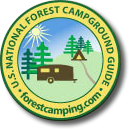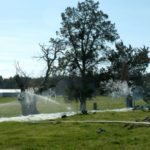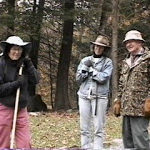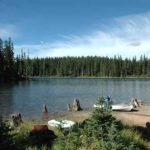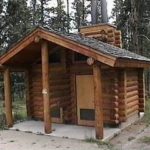Biomass and campgrounds – what’s the connection?
What is BIOMASS? and what does it have to do with campgrounds? Simply put it is “plant materials and animal waste used as fuel.” Or, in other words, when you build your campfire from stuff collected around the campsite (twigs, leaves, branches, and such) that’s biomass. (Here’s a photo of fire-killed trees in the Deschutes NF.)
 So, what is the connections between biomass, our national forests, and the delayed opening of campgrounds this season? Well —-
So, what is the connections between biomass, our national forests, and the delayed opening of campgrounds this season? Well —-
A bill was signed into law by President George W. Bush on Sept. 30, 2008 that offered potential benefits to biomass companies working with waste wood. This waste wood could be trees killed by fire or bugs (aka hazard trees and fuel for wildfires) or debris piles left by logging companies or a host of the things but it is all consider waste.
Chapter six of The Consolidated Security, Disaster Assistance, and Continuing Appropriations Act of 2009 (the above mentioned bill) included an allowance of $175 million for the U.S. Forest Service to use in removing wood determined to be “hazardous fuel” in areas of the country that are prone to wildfires, like Colorado and California.
The issue of waste wood removal from federal lands, and specifically from national forests, has been an issue of contention among members of Congress since the passage of the Farm Bill which included language disallowing the removal of such wood. In August 2008, Sen. John Thune, R-S.D., held a senate energy subcommittee hearing to discuss the matter, focusing on the removal of wood waste (aka biomass) in the Black Hills National Forest of South Dakota. Forestry experts who testified at the hearing contradicted the language of the farm bill, stating that not removing waste wood posed more risk to the health of a forest than if such debris was removed.
While reading about “Biomass” I came across several articles suggesting using the biomass from our national forests in the production of ethanol fuel. Sound like one good thing but there are a number of other uses for this biomass material. Here are some examples:
* Soil additives and amendments (a.k.a. mulch, compost, etc.);
* Firewood and fuelwood;
* Combustion fuel for biomass power plants;
* Solid wood products (lumber and roundwood);
* Densified fuels such as wood pellets and fire logs;
* Non-structural composite products like wood/plastic lumber and wood/cement products;
* Composite products such as particleboard and medium density fiberboard (MDF);
* Engineered wood products such as laminated veneer lumber;
* Pulp chips for paper products; and
* Organic chemicals including alcohol (ethanol, methanol), cellulose-based compounds, turpentine, tannins, pharmaceuticals, fragrances, and plastics.
Fred and I concluded a long time ago the people who best know the forest are the people who depend on it. I would like to believe Forest Service is the expert but you only have to listen to the conversation between people who live, work and enjoy our national forests to realize there are others who have an idea about what is right for forest lands. Harvesting biomass is one of those ideas. I still have a lot to learn about biomass but maybe it’s an idea who’s time has come.
But back to the late opening of some national forest campgrounds – tha the wood waste out of our campgrounds. Okay, we might not have as much shade as in days gone-bye, but the views will be super and we won’t have to worry about a tree drop on top of our tent late some night. Sounds like a win-win to me.t “allowance of $175 million for the U.S. Forest Service to use in removing wood determined to be “hazardous fuel” in areas of the country that are prone to wildfires” has been provided and the Forest Service and the Biomass industry are busy at getting (This photo shows a campground with no wood waste waiting to be harvested.)
the wood waste out of our campgrounds. Okay, we might not have as much shade as in days gone-bye, but the views will be super and we won’t have to worry about a tree drop on top of our tent late some night. Sounds like a win-win to me.t “allowance of $175 million for the U.S. Forest Service to use in removing wood determined to be “hazardous fuel” in areas of the country that are prone to wildfires” has been provided and the Forest Service and the Biomass industry are busy at getting (This photo shows a campground with no wood waste waiting to be harvested.)

